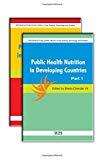
Public Health Nutrition in Developing Countries
によって
Sheila C. Vir
まだ評価がありません
Health & Wellness
形式
ペーパーバック
ページ数
1,318
言語
ヒンディー語
公開されました
Jan 1, 2011
出版社
Woodhead Publishing India
版
1
ISBN-10
938030806X
ISBN-13
9789380308067
説明
Sheila C. Vir explores the multifaceted challenges and opportunities surrounding public health nutrition in developing countries. Through her insightful analysis, readers gain an understanding of the complex interplay between nutrition, health, and socioeconomic factors in these regions. The book dives into the unique nutritional concerns that different communities face, highlighting the need for tailored approaches to improve health outcomes.
Drawing on extensive research and case studies, Vir underscores the importance of culturally relevant strategies that account for local food systems, dietary preferences, and health beliefs. This nuanced perspective emphasizes the role of community involvement and education in promoting healthier eating habits and overall well-being.
Moreover, the text discusses the impact of globalization and urbanization on traditional diets, offering a critical view of how modern influences can lead to nutritional deficiencies as well as obesity. By addressing these issues, the work paves the way for innovative solutions to combat malnutrition.
Vir’s approach is not just one of diagnosis but also of empowerment, urging policymakers, health workers, and communities to collaborate in creating effective public health initiatives. Through its compelling narrative, the work serves as an essential resource for anyone interested in enhancing nutrition and health in developing populations.
Drawing on extensive research and case studies, Vir underscores the importance of culturally relevant strategies that account for local food systems, dietary preferences, and health beliefs. This nuanced perspective emphasizes the role of community involvement and education in promoting healthier eating habits and overall well-being.
Moreover, the text discusses the impact of globalization and urbanization on traditional diets, offering a critical view of how modern influences can lead to nutritional deficiencies as well as obesity. By addressing these issues, the work paves the way for innovative solutions to combat malnutrition.
Vir’s approach is not just one of diagnosis but also of empowerment, urging policymakers, health workers, and communities to collaborate in creating effective public health initiatives. Through its compelling narrative, the work serves as an essential resource for anyone interested in enhancing nutrition and health in developing populations.



















